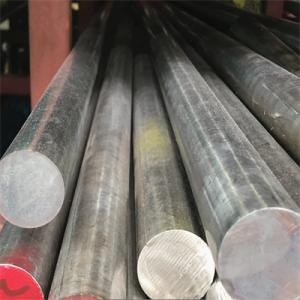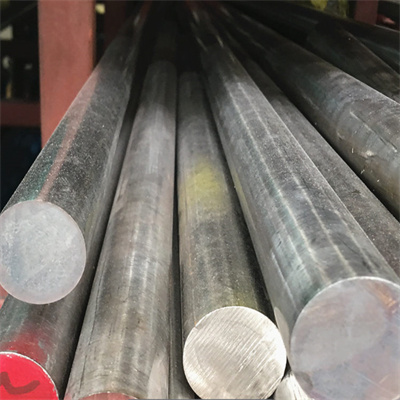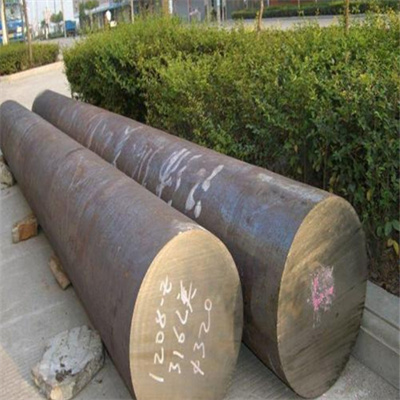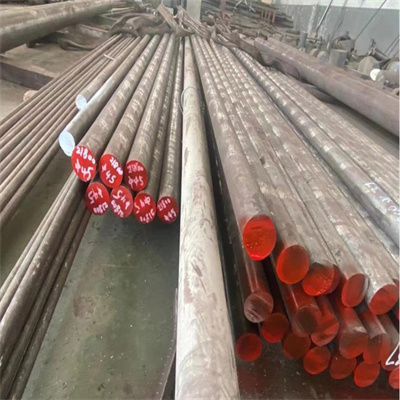High strength S17400 precipitation hardened martensitic stainless steel round steel
- Loading Port:
- XINGANG
- Payment Terms:
- TT OR LC
- Min Order Qty:
- 1 kg
- Supply Capability:
- 1000 kg/month
OKorder Service Pledge
OKorder Financial Service
You Might Also Like
Specification
High strength S17400 precipitation hardened martensitic stainless steel round steel
S17400 is a martensitic precipitation hardening stainless steel, also known as 17-4PH. This material is mainly composed of elements such as iron, chromium, nickel, titanium, and copper, and has high strength, high hardness, excellent welding performance, and corrosion resistance. The alloy composition of S17400 makes it excellent in mechanical properties, corrosion resistance, and processability, especially suitable for various industrial fields that require high strength, corrosion resistance, wear resistance, and fatigue resistance. Its applications are very extensive, including but not limited to manufacturing bearings, pump shafts, valves, mechanical seals, aircraft engine components, rocket engine components, ship components, etc. In addition, S17400 is widely used in the field of medical engineering, such as artificial skeletons, dental braces, pacemakers, etc.
Stainless steel round steel belongs to the category of long materials and also to the category of rods. The so-called stainless steel round steel refers to long materials with a uniform circular cross-section, generally about four meters long. It can be divided into light circles and black bars. The so-called light circle refers to a smooth surface that has undergone quasi rolling treatment; The so-called black rod refers to a surface that is black and coarse, directly hot-rolled.
The difference between round steel and other steel bars:
1. The appearance is different. Round steel has a smooth and round shape, without lines or ribs, while other steel bars have grooves or ribs on the surface, resulting in a low bonding force between round steel and concrete, while other steel bars have a high bonding force with concrete.
2. The composition is different. Round steel (first grade steel) belongs to ordinary low-carbon steel, while other steel bars are mostly alloy steel.
3. The strength is different, with round steel having lower strength and other steel having higher strength. That is, round steel with the same diameter can withstand less tensile force compared to other steel bars, but its plasticity is stronger. That is, round steel has greater deformation before being pulled apart, while other steel bars have much smaller deformation before being pulled apart.
Stainless steel round steel has broad application prospects and is widely used in hardware kitchenware, shipbuilding, petrochemicals, machinery, medicine, food, electricity, energy, aerospace and other fields.
Buyer Reading
All products in our store are photographed from real objects, with slight color differences in the pictures. For any product issues, please contact our merchant's after-sales service for assistance! The prices of our products are for reference only. There are many models in different series and prices may vary. Please consult the merchant before placing an order.
Products need to be customized in advance (such as non-standard production and processing). Please consult the merchant before placing an order to see if there is stock available. If customization is required, please confirm the order deadline (to avoid delaying your urgent needs).
- Q: How are steel round bars used in the construction of tunnels and underground structures?
- Steel round bars are commonly used in the construction of tunnels and underground structures as reinforcement for concrete. These bars are placed within the concrete to provide strength and stability, preventing the structure from cracking or collapsing under pressure. The steel round bars also enhance the overall durability and load-bearing capacity of the tunnel or underground structure, ensuring its long-term structural integrity.
- Q: How do you calculate the weight of a steel round bar?
- To determine the weight of a steel round bar, one can utilize the following equation: Weight = (Diameter^2 / 4) * Length * Density Within this equation, the Diameter signifies the round bar's diameter, Length denotes the bar's length, and Density represents the steel material's density. Initially, it is imperative to precisely measure the steel round bar's diameter. Subsequently, square the diameter by multiplying it by itself. Proceed to divide the outcome by 4. This shall yield the cross-sectional area of the round bar. Following this, multiply the cross-sectional area by the length of the bar. Lastly, multiply this value by the density of the steel material. Typically, the density of steel is around 7850 kg/m^3. The outcome of this computation shall furnish the weight of the steel round bar in either grams or kilograms, contingent upon the units implemented for the length and density.
- Q: What is the difference between a cold-drawn and a centerless ground steel round bar?
- A cold-drawn steel round bar and a centerless ground steel round bar are both types of steel bars that have undergone different manufacturing processes, resulting in different characteristics and properties. Cold-drawn steel round bars are produced by pulling a hot-rolled or annealed steel bar through a die to reduce its diameter and increase its length. This process improves the mechanical properties of the steel, making it stronger, more precise in dimensions, and with a smoother surface finish. Cold-drawn bars have a higher tensile strength, better surface finish, and tighter dimensional tolerances compared to hot-rolled bars. They are commonly used in applications where precision and strength are required, such as in automotive components, machinery parts, and construction materials. On the other hand, centerless ground steel round bars are produced by passing a cylindrical steel bar through a grinding machine without the need for centers or support. The grinding process removes surface imperfections and deviations in diameter, resulting in a precise and smooth finish. Centerless ground bars offer excellent dimensional accuracy, surface finish, and roundness. They are often used in applications where precision and tight tolerances are critical, such as in the manufacturing of bearings, shafts, and hydraulic cylinders. In summary, the main difference between a cold-drawn steel round bar and a centerless ground steel round bar lies in the manufacturing process and the resulting properties. Cold-drawn bars are formed by pulling the steel through a die, resulting in improved mechanical properties, tighter tolerances, and a smoother surface finish. Centerless ground bars are produced by grinding the steel to enhance dimensional accuracy, roundness, and surface finish. Both types of bars have their own advantages and are suited for different applications based on the required precision, strength, and surface finish.
- Q: Are steel round bars resistant to chemicals?
- The resistance of steel round bars to chemicals can vary depending on the specific steel type and the chemicals involved. Stainless steel round bars are well-known for their exceptional resistance to a wide range of chemicals, including acids, alkalis, and various organic compounds. This is because stainless steel contains high levels of chromium, which creates a protective oxide layer on the surface, preventing corrosion and chemical attacks. However, not all steel round bars possess the same level of chemical resistance. Carbon steel round bars, for example, are more prone to corrosion and chemical attacks compared to stainless steel. Corrosive chemicals, especially in highly corrosive environments, can affect carbon steel and cause damage. In such cases, it may be necessary to use additional protective measures, such as coatings or treatments, to enhance the chemical resistance. To summarize, stainless steel round bars provide excellent chemical resistance, whereas carbon steel round bars may require extra precautions to prevent chemical corrosion. When assessing the chemical resistance of steel round bars, it is crucial to consider the specific steel type, the type of chemical, and the environmental conditions.
- Q: Can steel round bars be coated?
- Yes, steel round bars can be coated. Coating steel round bars with materials like paint, epoxy, or zinc can provide protection against corrosion and enhance their aesthetic appearance.
- Q: What are the different treatments available for steel round bars?
- There are several different treatments available for steel round bars, including heat treatment, surface treatment, and coating. Heat treatment involves processes such as annealing, quenching, and tempering to improve the material's strength, hardness, and ductility. Surface treatments, such as polishing, grinding, or shot blasting, are used to enhance the surface finish and remove any imperfections. Coatings, such as galvanizing or painting, provide protection against corrosion and improve the overall appearance of the steel round bars.
- Q: What are the advantages of using nickel-iron alloy steel round bars?
- Nickel-iron alloy steel round bars offer numerous benefits. Firstly, they possess outstanding resistance to corrosion and oxidation, making them highly suitable for environments with moisture, chemicals, or high temperatures. This ensures their structural integrity and durability, reducing the need for frequent replacements or repairs. Secondly, these round bars exhibit excellent mechanical properties, including high strength, toughness, and hardness. This makes them ideal for heavy-duty applications in industries such as construction, manufacturing, and engineering. Additionally, nickel-iron alloy steel maintains its shape and dimensions even at extreme temperatures, thanks to its good thermal stability and resistance to thermal expansion. This reliability makes it perfect for high-temperature applications. Moreover, these round bars have remarkable magnetic properties, with high magnetic permeability. This makes them suitable for electromagnetic applications like transformers, inductors, and magnetic shielding, enhancing the efficiency of these devices. Lastly, nickel-iron alloy steel offers versatility in manufacturing processes and customization options. It can be easily machined, welded, and formed into various shapes and sizes, providing flexibility in design and application. This adaptability makes it a preferred choice in many industries. In conclusion, the benefits of using nickel-iron alloy steel round bars are evident in their corrosion resistance, mechanical properties, thermal stability, magnetic properties, and versatility. These qualities ensure optimal performance and longevity, making them reliable and suitable for a wide range of applications.
- Q: What are the different types of heat treatments used for steel round bars?
- Steel round bars can undergo various heat treatments to enhance their physical and mechanical properties for specific uses. 1. Annealing: To improve ductility and ease of workability, the steel is heated to high temperatures and gradually cooled, typically in a furnace. This relieves internal stresses and reduces the likelihood of cracking. 2. Normalizing: Similar to annealing, normalizing involves heating the steel to high temperatures and allowing it to cool in still air. This process refines the grain structure, leading to improved strength and toughness. 3. Quenching and tempering: This treatment involves rapidly cooling the steel after heating it to high temperatures, using liquids like oil or water. Quenching hardens the steel, increasing its strength and resistance to wear and deformation. However, this process can render the steel brittle, so tempering follows, which entails reheating the steel to lower temperatures and gradually cooling it. Tempering reduces brittleness while maintaining strength. 4. Case hardening: This treatment creates a hardened outer layer on the steel's surface while preserving a softer, more ductile core. By heating the steel with a carbon-rich material like charcoal or gas, carbon diffuses into the surface, forming a wear-resistant layer. The core remains tough and able to withstand shocks. 5. Stress relieving: This treatment alleviates internal stresses resulting from manufacturing processes like machining or welding. The steel is heated below its critical point and slowly cooled, effectively reducing residual stresses and enhancing dimensional stability. These represent only a selection of the common heat treatments employed for steel round bars. The choice of treatment depends on the desired properties and intended applications of the steel.
- Q: Can steel round bars be bent or formed into shapes?
- Yes, steel round bars can be bent or formed into various shapes through processes such as heating, hammering, or using specialized machinery like bending tools or hydraulic presses.
- Q: What is the difference between a cold finished and a hot rolled steel round bar?
- A cold finished steel round bar and a hot rolled steel round bar differ in their manufacturing processes and resulting properties. Cold finished steel round bars are manufactured through a cold drawing process, where the steel is pulled through a die at room temperature. This process results in a smooth, polished surface with tight dimensional tolerances. The cold drawing process also enhances the strength, hardness, and overall mechanical properties of the steel. Cold finished steel round bars are often preferred for applications where precision and a smooth surface are crucial, such as in machinery, automotive parts, and tools. On the other hand, hot rolled steel round bars are manufactured by heating the steel to a high temperature and then rolling it through a series of rollers. This process allows for the shaping and forming of the steel while it is in a pliable state. Hot rolled steel round bars have a rough, scaled surface and looser dimensional tolerances compared to cold finished bars. They also tend to have a slightly lower strength and hardness than their cold finished counterparts. Due to their more affordable cost and ease of production, hot rolled steel round bars are commonly used in construction, structural components, and general fabrication. In summary, the main differences between cold finished and hot rolled steel round bars lie in their manufacturing processes and resulting properties. Cold finished bars offer enhanced strength, precision, and a smooth surface, making them suitable for applications requiring high precision and mechanical performance. Hot rolled bars, on the other hand, have a rougher surface and looser tolerances, but their affordability and ease of production make them a popular choice for general applications.
Send your message to us
High strength S17400 precipitation hardened martensitic stainless steel round steel
- Loading Port:
- XINGANG
- Payment Terms:
- TT OR LC
- Min Order Qty:
- 1 kg
- Supply Capability:
- 1000 kg/month
OKorder Service Pledge
OKorder Financial Service
Similar products
Hot products
Hot Searches
Related keywords






















